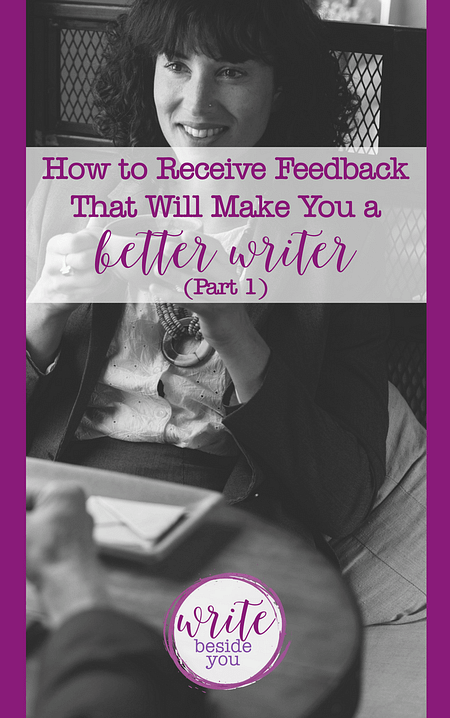How to Receive Feedback That Will Make You a Better Writer (Part 1)
[scroll-box]
—> Transcript — scroll to read! <—
* * * * *
How to Receive Feedback
That Will Make You a Better Writer (Part 1)
I had just finished the first draft of Chapter Three [of the book I’m writing with Amy Carroll], and it was kind of a condensation of a message that I have spoken, and I had to condense it down. I had to cut out like almost two thirds of the words. I kind of hope that it would work. It was a good message [which Amy had helped me develop in the first place via Next Step Coaching Services], and it was already kind of done, so what could be better than to just repurpose content? It’s never been in a book before, so it would be new in printed form.
So I sent it off to Amy, and kind of twiddled my thumbs a little waiting for her to get back to me, and tried not to bite my nails. I told her, I said, “Please be candid, be 100% candid. I think there’s some good things in here, but if you want me to, I’ll scrap the whole thing and start over from scratch.”
Well, she sent it back, and as only Amy can do, she was very supportive, and she said, “There’s some good things in here,” but the bottom line message was she did not feel that it was really anywhere near ready to call a chapter, and that it really … to try to shoehorn it into the book would really be force fitting.
Pick the Best Time to Hear a Writing Critique
I received that from her, I think it was Thursday, and I’m committed right now three hours each morning to working on writing. Rather than read her comments that she had put through track changes in the actually document, here’s what I did, and I found it really, really valuable. I haven’t always been able to do this. I tend to be the kind of person, the people-pleaser, the perfectionist, “Okay, how bad is it? Give me the bad news. I can’t sleep tonight. I won’t be able to think of anything else if I don’t read it right now.” I was like, “No, I’m not going to read it right now. I have time set aside tomorrow morning to go through this feedback.”
Prepare Your Heart to Receive a Writing Critique
I set aside that block of time, and I decided, “Okay, so I’m going to read her writing feedback, and then I’m going to fix everything. I thought, “No, I’ve set aside this block of time. What if I just spend that block of time with maybe some extra long time in scripture, and just make sure that before I listen to what Amy thinks of my writing, I remind myself of what God thinks of me, and more importantly, who God is, so that as I’m reading Amy’s comments, I’m thinking of who God is, and how we can best represent this message that He’s given us to our readers.”
That way, if that’s where my focus is, then whatever Amy says about my writing isn’t going to impact me nearly as much. That was like good stuff number one. It was like, “Get my priorities in order before going to people, even a person I trust, and love, and have had a long-term relationship with, like Amy, let me start in scripture and really linger,” and so I did. I spent … I mean, it was just relaxed, it was nice.
Don’t Rush to Fix Too Fast
The other thing I did, is I gave myself permission not to fix anything. That’s a change from the past, because in the past, it would be, “Okay, I’ll listen to your writing critique, but then I’ll start trying to fix it right away, which means I’m not really listening. I’m just going to try to make it go away, because criticism is so terrible.”
I was like, “What if I just linger in scripture until I really feel like I’m all charged up, and I’m ready to receive the writing critique that by the way, I have completely asked for? I have invited the writing critique, and then that’s it for the rest of that time, that three hour block. I just go through it, and read it, and just am present with it. Don’t try to change anything, don’t try to revise it, don’t try to make up for it as if, ‘Oh, okay, if I quickly fix it, then what? Amy will like me better? No. That’s not something I have to worry about.'”
That was just so, so valuable to realize I didn’t have to produce anything. I could just sit and process, and praycess, and kind of again, linger in that. What ended up happening was I did spend the extra time in scripture, I did spend completely un-rushed time in the Chapter Three feedback that I’d gotten from Amy, and then I did pull one chunk and put it into a whole new document, and I’m like, “Okay, this is the part that I need to keep.” It was some of the applications from a particular scripture of Jesus’ encounter with a particular woman.
See Feedback as an Invitation to Play
I just started to play, just started to play with the words. I had read some in my bible earlier, and I had a new idea, and I was like, “Let me just play with this, let’s just see what happens.” Well, 605 words later, I had started something that sprang from the seed that had been in my original draft, and that had been a part of the message that I had tried to condense, but suddenly, it was … I’ll tell you what it was like. Okay, this is it, this is coming to me. It was like taking a clipping of a plant that springs out roots real easily, and then grows, and that’s what happened. It’s like I took a clipping off of that message I had tried to force into a chapter, and now I was getting to watch it grow into something … a plant of its own.[/scroll-box]


Being present with it…so much yes!